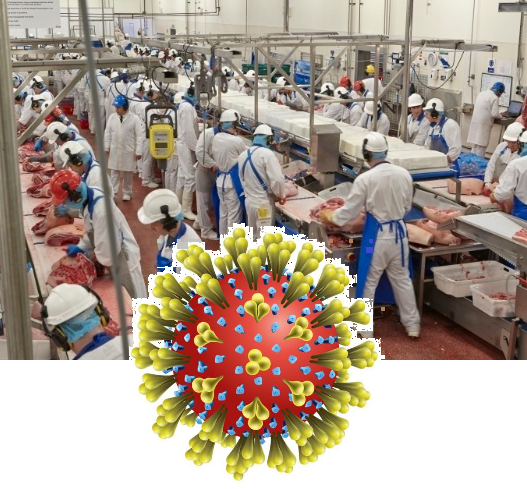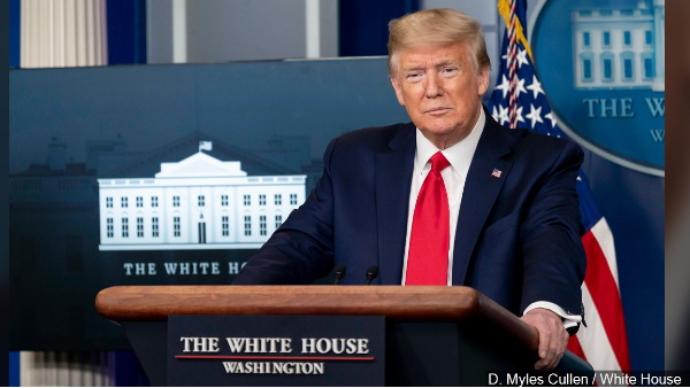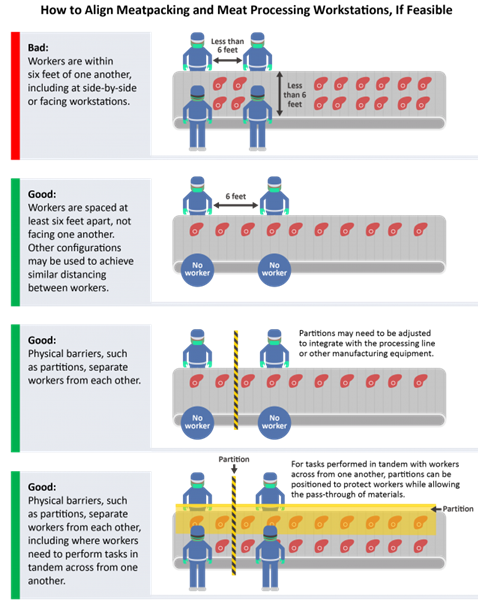President Trump signed an executive order to the meat industry to prevent closures
Meat plant closure due to COVID-19

Concerns about the integrity of the meat supply are increasing as more meat and meat plants are forced to close due to COVID-19. Three of the largest pork processors in the US had closed indefinitely, including Smithfield Foods in Sioux Falls, South Dakota, JBS pork processing in Worthington, Minnesota, and Tyson Foods in Waterloo, Iowa. Together, the three plants account for approximately 15% of US pork production
The plant closures and production reductions have decreased the national pork production by 25% and beef production by 10%.
In an open letter published as a full-page ad in Sunday’s New York Times, Washington Post and Arkansas Democrat-Gazette, Tyson’s chairman John H. Tyson said that further closures, not only of Tyson Foods facilities but competitors’ facilities as well, would put stress on the nation’s food supply. “As pork, beef and chicken plants are being forced to close, even for short periods, millions of pounds of meat will disappear from the supply chain. As a result, there will be limited supply of our products available in grocery stores until we are able to reopen our facilities that are currently closed,” he said
Tyson’s letter came a week after the company was forced to suspend operation in its largest pork plant in Waterloo, Iowa. The company also temporarily shut plants in Indiana, Washington, and another in Iowa. Other companies have temporary closed 15 beef and pork plants across the country after about 3,300 industry employees were infected with COVID-19, resulting in 17 deaths.
Are lawsuits coming?
A lawsuit was filed by employees of a Smithfield Foods plant Milan, MO, to “secure basic protective equipment and protocol changes that will stop the spread of COVID-19 in the plant and surrounding community.” At the time the lawsuit was filed, there were no confirmed cases among the Milan plant workers.
The lawsuit accuses Smithfield Foods plant of not providing sufficient protective equipment, forcing employees to use dirty masks, not having appropriate distance among workers, and discouraging workers from taking sick leave. It has been reported that the judge ordered the company to comply with the CDC-OSHA guidelines (see below).
The meat industry is concerned about more lawsuits and, as a result, opts to close facilities.
Trump issues an executive order

President Trump, by an Executive Order, placed the American meat industry under the Defense Production Act (DPA) to prevent meat shortages by keeping meat processing plants open. The order would designate meat processing plants as essential infrastructures, thereby keeping them open despite the spread of COVID-19 through the industry, with the federal government providing protective gear and guidance to workers.
The Defense Production Act (DPA) was passed by Congress in 1950 and signed into law by President Harry Truman. The DPA allows the President to direct private companies to act in the national interest during times of war, national emergency, or after terrorist attacks.
Due to the executive order and the authority of the DPA, the USDA said it would work with meat processors to affirm that plants keep operating following the CDC and OSHA guidelines (see below).
President Trump noted that meat processors are among the industries “having a liability that’s different for them. We’re going to take that liability [which] frees up the entire system.” The executive order does not show details as to how the administration’s order shields companies from claims that employees were inadequately protected.
By enacting the DPA, the meatpacking and processing facilities should be able to receive more tests and protective gear as they remain open.
CDC and OSHA issue new guidelines to the industry

The CDC advises meat and poultry plants that critical infrastructure workers such as meat processing workers are permitted to continue working even after a potential exposure to COVID-19, provided that they remain asymptomatic and that additional cautions are taken and implemented to protect them and the community.
In the issued guidelines to the industry, it requires that the configuration of the communal work environments to ensure that workers are spaced at least six feet apart in all directions, if possible. Ideally, modify the alignment of workstations so that workers do not face one another and practicing social distancing on breaks.
The document recommends the use of physical barriers, such as strip curtains, plexiglass or similar materials, or other impermeable dividers or partitions, to separate meat and poultry processing workers from each other, if feasible.
Another recommendation is to place handwashing stations or hand sanitizers with at least 60% alcohol in multiple locations to encourage hand hygiene. Stagger break times and provide temporary break areas and restrooms to avoid groups of workers during breaks. Stagger workers’ arrival and departure times to prevent congregations of workers in parking areas, locker rooms, and near time clocks. The CDC recommends wearing cloth face coverings as a protective measure. See the CDC link for more details.
Reactions to the executive order
Several trade organizations praised the President. The North American Meat Institute President and CEO Julie Anna Potts said: “By keeping meat and poultry producers operating, the President’s executive order will help avert hardship for agricultural producers and keep safe, affordable food on the tables of American families.” “The safety of the heroic men and women working in the meat and poultry industry is the first priority.”
The National Cattlemen’s Beef Association CEO Colin Woodall said, “While there are currently no widespread shortages of beef, we are seeing supply chain disruptions. We thank President Trump for his recognition of the problem and the action he has taken today to begin correcting it.”
The National Chicken Council President Michael Brown said in a statement, “We are grateful to President Trump for making this bold decision to protect our country’s food supply during these unprecedented times.
The executive order has created a clash between meat companies and labor unions, as some workers say their employers aren’t doing enough to protect them. “Though National Farmers Union shares the president’s concerns around maintaining food system infrastructure, the organization is equally concerned with the health and wellbeing of meat plant employees,” the group’s statement said.
“We only wish that this administration cared as much about the lives of working people as it does about meat, pork, and poultry products” Stuart Appelbaum, President of the Retail, Wholesale and Department Store Union, said in a statement.
